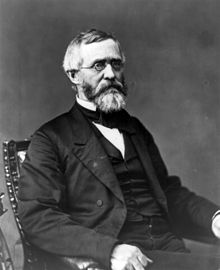Ebenezer R. Hoar
Ebenezer Rockwood Hoar (born February 21, 1816 in Concord , Massachusetts , † January 31, 1895 ibid) was an American lawyer , politician and attorney general (Attorney General) .
Family, studies and professional career
Hoar came from a large influential family in the northern states of Massachusetts and Connecticut . His father Samuel Hoar was an influential lawyer and also a member of the US House of Representatives. His brother George was also a member of the US House of Representatives and then US Senator for Massachusetts for 27 years . His own son Sherman was also a lawyer and a member of the US House of Representatives. His maternal grandfather was Roger Sherman , who was not only a signatory to the United States Declaration of Independence , but also a United States Senator from Connecticut .
Hoar himself first completed a general education course at Harvard University , which he graduated in 1835 with a Bachelor of Arts (BA) . After studying law at Harvard Law School , which he completed in 1839 with a Bachelor of Laws (LL.B.), he was admitted to the bar in 1840. He then worked for several years as a lawyer in Concord and Boston . From 1849 to 1855 he was a judge on the Court of Common Pleas in Boston. After four years as a lawyer, he became a judge at the Supreme Judicial Court of Massachusetts in 1859 , of which he was a member until 1869. In 1874 he was elected to the American Academy of Arts and Sciences .
Political career
Attorney General under President Grant
Hoar began his political career in 1846 when he was elected a member of the Massachusetts Senate . There he represented the interests of the Whig Party until 1849 and was an opponent of slavery . On March 5, 1869, President Ulysses S. Grant appointed him to succeed his first cousin, William M. Evarts , as Attorney General in his cabinet . He held this office until his replacement by Amos T. Akerman on November 22, 1870.
President Grant's intended appointment as a judge at the United States Supreme Court failed because Hoar was rejected by the US Senate . The reason for this was that Hoar opposed the common practice of assigning judges to politicians who were not re-elected and instead filled several judges with legally competent experts. He was also a critic of the impeachment proceedings instituted against President Andrew Johnson in the spring of 1868.
During his tenure, the legislation to reorganize the Ministry of Justice took place .
Alabama question and Congressman
In 1871 he belonged to the later Attorney General George H. Williams on a commission to clarify the Alabama question based on the Washington Treaty . It was a case of damages proceedings between the United Kingdom and the USA on the question of the due diligence of neutral states regarding the equipment of warships in their ports. Ultimately, the United Kingdom was obliged to pay $ 15.5 million in gold for damage caused by southern ships equipped in England to the northern states during the Civil War .
In 1873 he was elected a member of the US House of Representatives. There he represented the interests of the seventh congressional electoral district of Massachusetts as a Republican until 1875 . After he was not re-run as a congressional candidate in 1874, he withdrew from political life and again worked as a lawyer. From 1868 to 1882 he was a member of the Advisory Board ( Board of Overseers ) of Harvard University .
Publications
- Ebenezer Rockwood Hoar: Address at the laying of the corner stone of the Memorial Hall. Tolman & White, printers, Boston 1870.
- Ebenezer Rockwood Hoar: Address in the old Concord Meeting House, April 19, 1894. Beacon Press, T. Todd, printer, Boston 1894.
literature
General biographical information and monographs
- George Frisbie Hoar: The charge against President Grant and Attorney General Hoar of packing the Supreme Court of the United States. Press of C. Hamilton, Worcester MA 1896.
- Moorfield Storey, Edward W. Emerson: Ebenezer Rockwood Hoar; A memoir. Houghton Mifflin, Boston / New York 1911.
- Hoar, Samuel . In: James Grant Wilson, John Fiske (Eds.): Appletons' Cyclopædia of American Biography . tape 3 : Grinnell - Lockwood . D. Appleton and Company, New York 1887, p. 220 (English, full text [ Wikisource ] - mention by father).
Alabama question
- Alabama question . In: Meyers Konversations-Lexikon . 4th edition. Volume 1, Verlag des Bibliographisches Institut, Leipzig / Vienna 1885–1892, p. 272.
- Friedrich Heinrich Geffcken : The Alabama question. Stuttgart 1872.
- Felix Lehner: JC Bluntschli's contribution to solving the Alabama question; an episode in the development of transatlantic solidarity . Zurich 1957.
Web links
- Biographies of President Grant's Cabinet Members ( January 30, 2013 memento on the Internet Archive )
- Biography on the homepage of the Ministry of Justice
- Ebenezer R. Hoar in the Biographical Directory of the United States Congress (English)
- Biography in the US legal dictionary
- Ebenezer R. Hoar in the Miller Center of Public Affairs of the University of Virginia (English)
| personal data | |
|---|---|
| SURNAME | Hoar, Ebenezer R. |
| ALTERNATIVE NAMES | Hoar, Ebenezer Rockwood (full name) |
| BRIEF DESCRIPTION | American lawyer and politician |
| DATE OF BIRTH | February 21, 1816 |
| PLACE OF BIRTH | Concord , Massachusetts |
| DATE OF DEATH | January 31, 1895 |
| Place of death | Concord , Massachusetts |


